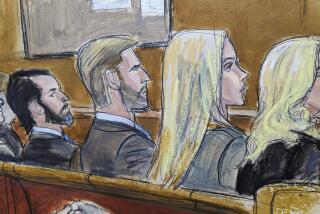Smith Case Seen Leading to Regular Televising of Trials : Law: Experts say coverage of Palm Beach proceedings means TV role is here to stay. Sensationalism is a worry.
- Share via
WASHINGTON — Because of the William Kennedy Smith rape case, a new kind of television broadcast--live coverage of courtroom trials--will make regular appearances in American homes, legal and media experts said Thursday.
The national exposure given the case means that the televising of trials “is going to be irreversible,” said George Washington University law professor Gerald Caplan.
“People have always been able to walk into the courtroom and see a trial but not many could take advantage of that opportunity. Now, millions of people will have that opportunity,” Miami attorney Karen Kammer said.
Most lawyers welcomed the idea, saying that it will educate Americans about the law and show how courts really operate. But others worried that broadcasters will offer sex and sensationalism more than a sober look at American law.
The Palm Beach case, of course, offered both aspects. Many viewers saw for the first time a live criminal trial in which witnesses told sharply conflicting stories without one of them breaking down dramatically and confessing on the witness stand--as happened frequently on the old “Perry Mason” television show. They saw lawyers argue over “reasonable doubt” and burdens of proof. But they also saw and heard discussions of pantyhose, semen stains and erections.
Advocates of TV coverage contended that most Americans understand and accept the acquittal of William Kennedy Smith only because they saw the case unfold the way the jury saw it.
“Imagine if this had not been shown and he got off. Millions of people would have said, “the Kennedys fixed the case” said Steven Brill, publisher of the American Lawyer magazine and founder of the new Court Television Network, which along with CNN broadcast the trial.
“Compare this to Chappaquiddick,” he added, which cast doubt on the legal system when Sen. Edward M. Kennedy (D-Mass.) in a brief Massachusetts court appearance was given a light reprimand for the 1969 auto accident that killed a female aide.
Florida has been a leader in televising court cases, attorney Kammer noted. “It is routine here and studies have shown that the presence of the camera in the back of the courtroom has had no impact at all in how the trials are conducted,” she said.
But others questioned the value of airing the sensational rape trial in American homes.
“This was about pandering and titillation, not about education and information about the law,” said Robert Lichter, director of the Center for Media and Public Affairs in Washington. “I don’t buy the notion that people tuned into this to get a better understanding of the legal system. This case was about sex, famous people and tabloid values.”
Lichter said that television can play a useful role in covering some trials but he worried that broadcasters will focus on cases that are gory or sensational.
“In journalism, you have to make judgment calls, but this was a judgment call made for reasons of voyeurism and entertainment,” he said. “I think we should have passed on this one.”
Brill, whose “Court TV” is available on cable networks in San Diego, but not in most of Los Angeles and Orange counties, said that his broadcasters select trials that have legal and social significance, not just those that might prove entertaining.
“For example, we would not have covered Zsa Zsa Gabor’s case. That was just a publicity stunt,” he said. But he added that the network is seeking permission to televise the pending trial of Los Angeles police officers indicted in the beating of motorist Rodney G. King.
Although there have been fears that cameras could distort the way trials are conducted, Bruce Rogow, a trial lawyer and Nova University law professor, said that the Palm Beach case should help put those concerns to rest.
“If anything, (cameras) probably make a trial fairer. The judges are more careful. The players know they are under scrutiny. It helps keep the proceedings honest,” Rogow said.
Meanwhile, as lawyers and media experts debated the impact of television on the Smith trial, the aftereffects of the trial were still being felt in Palm Beach.
David H. Bludworth, Palm Beach County state attorney, Thursday defended his decision to bring charges and the much-criticized handling of the case by Assistant State Atty. Moira K. Lasch.
Bludworth said that the allegations were “thoroughly, fairly and impartially investigated before being filed.” In a statement, he also denounced the “Monday morning quarterbacks and so-called trial experts who . . . will do some second-guessing.” Lasch, meanwhile, took the day off.
In an interview about the case, lead defense attorney Roy E. Black said that the accuser’s performance on the witness stand was “one of the finest jobs I’ve seen--but maybe a little too dramatic. There were too many tears” and too many memory gaps.
Lea Haller, a 37-year-old juror, said that the six jurors thought that both Smith and the woman gave believable testimony. But it was clear from the first secret ballot that the group believed there was a reasonable doubt, she said.
Smith celebrated at the family’s oceanfront home the night of the verdict, a family spokesman said. He plans to spend the next several days relaxing at the house and will begin a residency program at the University of New Mexico after spending Christmas with his family.
Times staff writer Ronald J. Ostrow contributed to this story.
More to Read
Sign up for Essential California
The most important California stories and recommendations in your inbox every morning.
You may occasionally receive promotional content from the Los Angeles Times.












